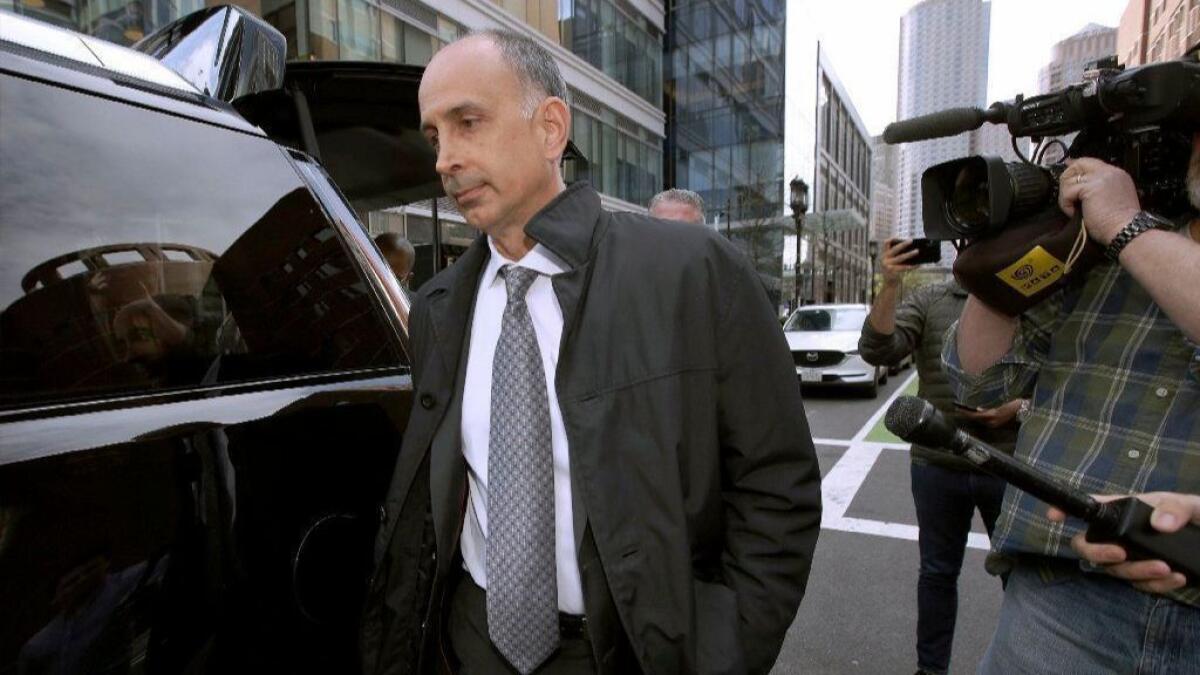In college admissions scam, a parent’s ‘victim’ claim fails. Stephen Semprevivo gets 4 months in prison

- Share via
In a bid to evade prison for his part in the college admissions scandal, one Los Angeles business executive attempted a risky balancing act.
Stephen Semprevivo entered a felony guilty plea for paying the scam’s leader $400,000 to sneak his son into Georgetown University. Nonetheless, through one of his attorneys, Semprevivo told a judge he shouldn’t be put behind bars because he was a “victim” in the case and had been preyed upon and hoodwinked.
Semprevivo’s plea for leniency failed Thursday when the judge sentenced him to four months in federal prison, making him the latest parent in the case to be punished with incarceration. He must report to prison by Nov. 7.
With the penalty, U.S. District Judge Indira Talwani staked out a middle ground between Semprevivo’s request for probation and the 13-month sentence prosecutors had urged her to deliver.
Talwani took the same approach when she sentenced another Los Angeles businessman as well as actress Felicity Huffman to prison in recent days. Her decision Thursday was further indication the judge had concluded that some amount of time in prison was the appropriate punishment for mothers and fathers caught up in the case.
Over the coming weeks, Talwani and other judges are scheduled to sentence several more parents who have admitted to conspiring with William “Rick” Singer, the college admissions consultant at the center of the scheme, to either rig their children’s college entrance exams or secure them admission spots reserved for recruited athletes.
In all, more than 50 people have been charged by prosecutors from the U.S. attorney’s office in Boston, which opened a far-reaching investigation into Singer after catching wind of him by luck.
Soon after he was charged with conspiracy to commit fraud in March, Semprevivo, a 53-year-old father of two who served as an executive at several companies, pleaded guilty in a deal with prosecutors. Semprevivo admitted to knowing the hefty sum he paid was part of a “side door” plan Singer offered, in which Semprevivo’s son was awarded a spot reserved for students recruited to play tennis for the school.
To sell the charade, Singer gave Semprevivo a bogus letter and personal essay for his son full of fake tennis achievements that was submitted as part of the teen’s college application. Semprevivo’s son, who enrolled at the school in 2016, was not a competitive tennis player and did not join the school’s team.
But in a memo filed in advance of Thursday’s sentencing hearing, Semprevivo’s attorney, David Kenner, made his client out as a nearly helpless victim of Singer’s criminal overtures.
“It is undisputed that Rick Singer prayed on Stephen, and parents like him, in his 25-million-dollar racketeering bonanza, that to some real extent makes Stephen a victim,” Kenner wrote.
Kenner claimed Semprevivo was a particularly easy target for Singer because he came from a “world of successful businessmen and professionals,” which primed him to “fixate unreasonably on a degree from Georgetown” and view admission to an elite school as “the holy grail.”
“Once targeted, Singer drew them in, parted them from their money and made them complicit in his scheme,” Kenner wrote of parents who conspired with Singer.
Kenner claimed Singer steered Semprevivo’s son away from less prestigious schools and then told the father and son the chances of getting admitted to Georgetown were slim unless they paid him for his illicit access.
In the memo, Kenner acknowledged Semprevivo knowingly went along with the plan but claimed the father was driven by fear. To bolster his claim, he attached a report from a criminologist Semprevivo’s defense team hired. The report included an excerpt from a meeting Semprevivo had with a psychologist.
“Rick had a volatile personality. I was afraid of him. I kept thinking what would happen if he erupted, if we pulled out,” Semprevivo allegedly said. “I don’t know if I feared him physically, but I do recall him saying, ‘Don’t make me chase you for the money.’ That was a scary thing to hear him say. So I felt trapped, that I couldn’t back out.”
Prosecutors in the case pushed back against the sympathetic story line. In their own memo to Talwani, they chastised Semprevivo for his attempts “to deflect core responsibility for his crimes.”
“Semprevivo’s persistent attempts to evade responsibility and to blame others, and his lack of remorse, highlight the need for specific as well as general deterrence in this case,” the government lawyers wrote to make the case for why time in prison was an appropriate punishment.
Semprevivo belonged to a particularly culpable group of parents who involved their children in the scam, prosecutors wrote. They criticized him as well for making the decision to file a short-lived lawsuit against Georgetown in an attempt to keep the school from annulling his son’s credits.
The lawsuit, which eventually was dropped, “meets the classic definition of chutzpah,” the memo said, comparing Semprevivo to a “child who murders his parents and then pleads for mercy because he is an orphan.”
In addition to prison, Semprevivo was ordered to pay a $100,000 fine and serve 500 hours of community service. He also must pay restitution to Georgetown, which said it has so far incurred $105,341 in legal fees from investigating Singer’s scam. Semprevivo’s fine may be adjusted once Talwani determines how much he should pay Georgetown, which will be settled at a future hearing.
More to Read
Sign up for Essential California
The most important California stories and recommendations in your inbox every morning.
You may occasionally receive promotional content from the Los Angeles Times.













